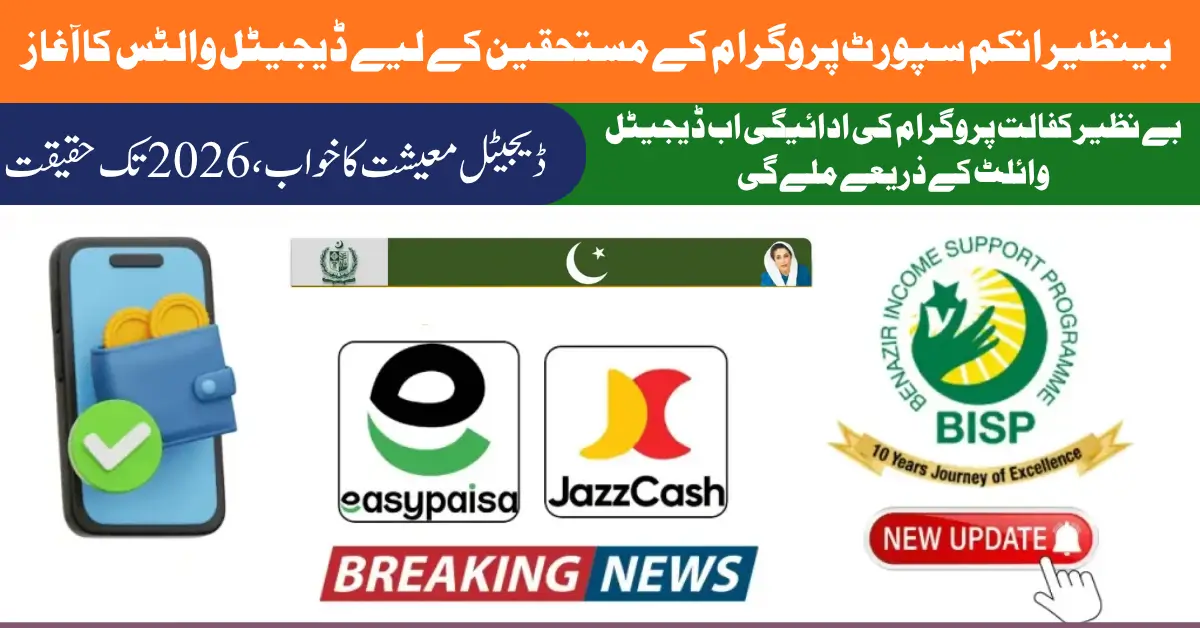BISP Digital Wallet
BISP Digital Wallet: As the world rapidly shifts towards digital economies, Pakistan is taking bold steps to ensure it doesn’t fall behind. With the Prime Minister’s Cashless Pakistan Strategic Roadmap, the country is laying the foundation for a future where digital transactions are the norm, not the exception. The plan envisions transforming Pakistan into a digital-first society by 2026, with the target of expanding digital payments across all sectors. Let’s take a closer look at this ambitious roadmap, the goals, and what it means for Pakistan’s future.
Key Goals of the Cashless Pakistan Strategic Roadmap
The Cashless Pakistan initiative has set some highly ambitious yet achievable goals. These goals aim to drive Pakistan towards a fully digital economy by 2026, focusing on increasing the use of digital payments, empowering citizens, and making everyday transactions more convenient, secure, and transparent.
Saudi-Pak Business Council Delegation Meets CM Maryam Nawaz: Investment Boost in Punjab Announced
1. Increasing Active Digital Merchants
Currently, Pakistan has around 500,000 active merchants participating in digital transactions. However, the roadmap sets a target to increase this number to 1.5 million merchants by June 2026. This goal is a crucial step toward fostering a digital economy, as it directly impacts how businesses interact with consumers. By increasing the number of merchants accepting digital payments, the roadmap is working to create a more inclusive economy, where both small and large businesses can benefit from the ease of digital transactions.
2. Boosting Digital Transaction Volume
The Cashless Pakistan plan also aims to increase the volume of digital transactions from 7.5 billion to 15 billion annually by June 2026. This goal is part of a larger effort to enhance the adoption of digital payments across Pakistan. By making digital transactions more common and accessible, the government seeks to reduce the dependence on cash, which can be cumbersome and inefficient. These efforts will also provide consumers with greater convenience, safety, and traceability.
3. Empowering Benazir Income Support Program (BISP) Beneficiaries
One of the most impactful aspects of this roadmap is its focus on the Benazir Income Support Program (BISP). BISP is a social welfare initiative that helps low-income families across Pakistan. Under the roadmap, all BISP beneficiaries will be converted into digital wallets. This transformation will provide beneficiaries with direct access to government funds via digital platforms, ensuring faster, more secure, and transparent transactions. Digital wallets will also help improve financial inclusion, allowing beneficiaries to access other financial services and empowering them to better manage their finances.
October 2025 LPG Price in Pakistan: OGRA Reduces Domestic Cylinder Rate by Rs79

Building a Digital Ecosystem: Key Initiatives and Milestones
The Cashless Pakistan roadmap includes several important initiatives aimed at making digital transactions more accessible and secure for everyone. These initiatives include the development of a Digital Index to track progress, the digitization of services on the Citizen Islamabad app, and the activation of the Digital Nation Pakistan Authority.
1. Launching the Digital Index
To track the progress of digital transactions and the adoption of digital services across the country, the government will launch the Digital Index. This will serve as a performance monitoring tool, allowing citizens, businesses, and policymakers to see how well the country is moving toward its digital goals. The Digital Index will also highlight areas that need improvement, ensuring that the transformation is continuous and effective.
2. Digitizing Services on the Citizen Islamabad App
The Citizen Islamabad app will play a crucial role in the roadmap’s success. The plan calls for the complete digitization of services offered through the app, providing a one-stop digital platform for citizens to access government services. This will not only streamline processes but also make government services more efficient and accessible to people living in urban and rural areas alike.
3. Establishing the Digital Nation Pakistan Authority
To ensure the smooth implementation of the roadmap, a new government body, the Digital Nation Pakistan Authority, will be activated. This authority will be responsible for overseeing the digital transformation process, setting policies, and ensuring compliance across all sectors. It will play a critical role in creating a cohesive, secure, and effective digital ecosystem in Pakistan.
BISP 8171 Validation Portal October 2025 – Confirm Rs13,500 Support & Beneficiary Status
Government-to-Government (G2G) and Public-to-Government (P2G) Payments: A Fully Digital Transition
A significant milestone in the roadmap is the complete transition of all Government-to-Government (G2G) and Public-to-Government (P2G) payments to digital platforms. This means that all financial transactions between the government and other entities, including businesses and citizens, will be carried out digitally. This shift aims to reduce corruption, increase efficiency, and improve transparency in government dealings.
By digitizing government payments, Pakistan will also be able to track funds more effectively, reducing waste and ensuring that resources are used where they are needed most. Moreover, it will create a more secure system, minimizing the risks associated with physical cash handling, such as theft or fraud.
The Role of Digital Wallets in Financial Inclusion
One of the key advantages of the Cashless Pakistan initiative is the potential for financial inclusion. By converting BISP beneficiaries into digital wallet users, the government is empowering millions of people who have limited access to traditional banking services. Digital wallets will provide these individuals with a secure platform to receive payments, make transactions, and even save money.
Digital wallets are also an essential tool for expanding access to credit, insurance, and other financial services that were previously out of reach for many low-income families. This move will help integrate marginalized communities into the broader financial system, boosting economic participation and improving livelihoods.
FBR Extends Income Tax Return Filing Date for FY 2024-25 – New Deadline October 15, 2025
Challenges and Opportunities Ahead
While the Cashless Pakistan roadmap sets ambitious targets, there are several challenges that need to be addressed to make this vision a reality. Some of these challenges include:
- Digital Literacy: Many people, especially in rural areas, may lack the necessary skills to navigate digital platforms. Addressing this gap through education and training programs will be crucial to the success of the roadmap.
- Infrastructure: To support the widespread adoption of digital payments, Pakistan will need to improve its digital infrastructure, including internet access and mobile networks, particularly in remote areas.
- Cybersecurity: As more people rely on digital platforms, the risk of cyber threats increases. Strengthening cybersecurity measures will be essential to build trust in digital payments and ensure the safety of users’ financial information.
However, these challenges also present significant opportunities. The transition to a cashless society could stimulate innovation in fintech, create new jobs, and provide the government with better tools to improve public services.
A Cashless Pakistan by 2026 – A Digital Future
Pakistan’s move towards a cashless economy is an exciting step into the future. The Cashless Pakistan Strategic Roadmap is designed to ensure that the country’s digital transformation is inclusive, secure, and efficient. By increasing the number of digital merchants, expanding digital transactions, and empowering vulnerable communities like BISP beneficiaries, the government is laying the groundwork for a more connected and prosperous society.
As the roadmap progresses towards its 2026 goals, the active participation of government bodies, businesses, and citizens will be critical. With the right support and infrastructure, Pakistan can successfully become a digital-first nation, ready to thrive in the global digital economy.
Sohail Afridi Emerges Victorious in KP CM Race Despite Opposition’s Boycott of Proceeding

